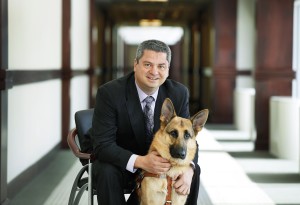Shedding light on disability, elder issues
“Not a day goes by that my routine is not disrupted because I must advocate for my right to allow my Seeing Eye dog to guide me through the doors of public buildings ”“ and I am a lawyer. Can you imagine how difficult and demoralizing that would be for someone who doesn”™t have the legal training and/or assertiveness that I possess?” So wrote Michael J. Amoruso, managing partner of Rye Brook-based Amoruso & Amoruso L.L.P. in an article published earlier this year in the National Academy of Elder Law Attorneys (NAELA) magazine.
In it, he made a powerfully persuasive argument for the U.S. Congress to act to correct the language in a 20-year law that created a misplaced presumption that a person with disabilities lacks the equality or mental capacity to enter into a supplemental needs trust (SNT). “Congress made what appears to be a legislative drafting error limiting the establishment of SNTs to the parent, grandparent, legal guardian or court ”¦ but not the individual,” Amoruso said. But, in so doing, it made a presumption about the competency of disabled people, one that we would not make about President Franklin Roosevelt, Helen Keller, Ray Charles or our wounded veterans, Amoruso noted.
Since becoming chairman of the NAELA”™s Public Policy Committee this year, Amoruso has been hard at work to attract more senators and Congressional representatives to sponsor passage of the Special Needs Trust Fairness Act, which would end the longstanding injustice by simply adding the phrase “by such individuals” to the original measure so that “those of us who have disabilities can regain the dignity we deserve.” Amoruso is confident that the change in the law, one that is a simple fix and will not be costly, will pass Congress in the near future.

“My personal experience is the passion that fuels me,” said Amoruso, who has had hearing loss since he was a child and started to go blind as a young man ”“ disabilities he did not allow to get in the way of his becoming a prominent elder law/estate planning and special needs attorney. In addition, he is also a New York Metro Super Lawyer for Elder Law (a top legal profession ranking he earned three years in a row since 2010), as well as an influential and respected advocate on public policy issues impacting elder law and special needs issues on the local, state and national levels.
As Amoruso”™s former mentor and retired judge Vincent A. Delorio observed in an article in the September 2013 issue of New York Metro Super Lawyers magazine: “He has more empathy as a result of his own personal issues and is more receptive, patient and understanding of people”™s problems.”
When Amoruso graduated from Boston College Law School, he contemplated a mergers and acquisition practice. But, the experience of working pro bono on a special needs case for a disabled woman made him realize what he really wanted to do. In 2001, he and his attorney wife and partner, Sreelekha, established the firm.
In building a successful practice, he has been guided by a family Italian motto: “Avanti, sempre avanti”, which translates to “Forward, always forward.” That, combined with a business approach about taking the time to listen carefully to his client”™s problems and tailoring solutions-based plans, has produced a strong referral base of grateful clients.
The personal satisfaction Amoruso derives each time he helps bring peace of mind to a client is its best reward. Case in point is a 70-year-old woman who had been taking care of her paraplegic husband in their home and recognized that as she got older, it would become more difficult for her to continue to do that. It took more than a year and a half of research and Amoruso personally making phone calls to facilities himself, but he found the right one that would provide the care the husband needed while allowing the wife to visit every day.
Keeping abreast of changes impacting elder law practice gives him an edge to act proactively on behalf of his clients. He finds one recent development especially troubling. It is the shift in the New York state Medicaid program to a managed care model that has dramatically cut the long-term live-in allowance from 13 days to six days per month. He says the reduction potentially puts some individuals, especially those suffering from dementia in harm”™s way, as they are in critical need of this service.
What”™s his strategy to deal with this latest challenge to his clients? As with other issues he has successfully fought, his guidance will be focused and his advocacy voice will be loud and clear. After all, he is emboldened yet again by “Avanti, sempre avanti.”
Winners Circle is a biweekly feature that takes a look at the top women business executives and top attorneys, men and women, in the region. To nominate someone, please contact John Golden at jgolden@westfairinc.com.